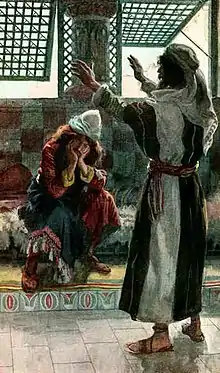Nathan (prophet)
Nathan (Hebrew: נָתָן Nāṯān, "Given"; fl. c. 1000 BC) is a prophet in the Hebrew Bible. His actions are described in the Books of Samuel, Kings, and Chronicles (especially 2 Samuel 7:2–17, 12:1–25).

Biblical accounts
Nathan was a court prophet in the time of King David. He is introduced in 2 Samuel 7:2 and 1 Chronicles 17:1 as an advisor to David, with whom David reflects on the contrast between his own comfortable home and the tent in which the Ark of the Covenant is accommodated. Nathan then announces to David the covenant God was making with him (2 Samuel 7:4–17, a passage known as Nathan's Oracle),[1] contrasting David's proposal to build a house (i.e. a building) for the Ark with God's plan to build a house (i.e. a dynasty) for David. Later, he comes to David to reprimand him for committing adultery with Bathsheba while she was the wife of Uriah the Hittite, whose death the King had also arranged to hide his previous transgression (2 Samuel 12:7–14).[2]
According to Chronicles, Nathan wrote histories of the reigns of both David (1 Chronicles 29:29) and Solomon (2 Chronicles 9:29), and was involved in the music of the temple (see 2 Chronicles 29:25).
In 1 Kings 1:8–45 it is Nathan who tells the dying David of the plot of Adonijah to become king, resulting in Solomon being proclaimed king instead.[3] Nathan presides at the anointing of King Solomon. The Midrash teaches that two honorary seats flanked the throne of King Solomon, one for Nathan and the other for Gad the Seer.[4]
A lost Book of Nathan the Prophet is mentioned in 1 and 2 Chronicles. Although the work appears to have been lost, some speculate that some of its content have been incorporated into the books of Samuel or Kings.[5] The 15th century Jewish scholar, Isaac Abarbanel, proposed that Samuel started his book, but Nathan completed the work.[6]
Feast day
In the Eastern Orthodox Church, and those Eastern Catholic Churches which follow the Byzantine Rite, he is commemorated as a saint on the Sunday of the Holy Fathers (i.e., the Sunday before the Great Feast of the Nativity of the Lord). According to the Orthodox Church in America website,[7] the Prophet Nathan is commemorated on December 14.
As a name
Derived from this biblical character, "Nathan" is used as a male first name in various languages.
See also
References
- The Composition of Nathan's Oracle to David (2 Samuel 7:1-17) as a Reflection of Royal Judahite Ideology, Journal of Biblical Literature, Vol. 129, No. 2 (Summer 2010), pp. 261-279, accessed 15 July 2017
- Holman Bible Editorial Staff, Holman Concise Bible Dictionary, B&H Publishing Group, USA, 2011, p. 446
- J. D. Douglas, Merrill C. Tenney, Zondervan Illustrated Bible Dictionary, Zondervan Academic, USA, 2011, p. 998
- "Nathan the Prophet - Jewish History". Retrieved March 14, 2022.
- "Why Was Nathan the Prophet So Important to King David?". biblestudytools.com. Retrieved 2022-03-14.
- Haas, Jair. “Isaac Abarbanel’s Defense of the Authority, Reliability and Coherence of Biblical Historiography.” Hebrew Union College Annual, vol. 82–83, 2012, pp. 212f. JSTOR website. Retrieved 2 Oct. 2023.
- "Prophet Nathan". www.oca.org. Retrieved 2022-03-14.